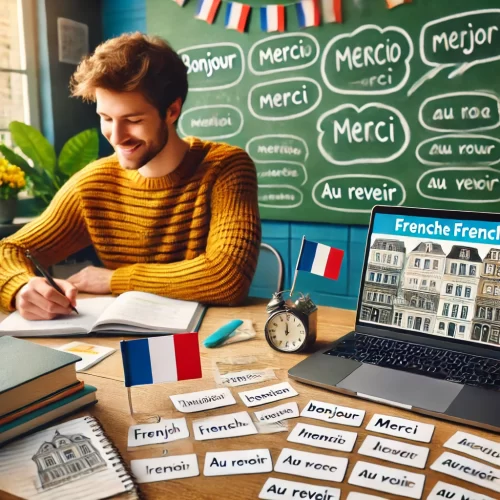Mastering French greetings and common phrases is a fundamental step towards effective communication in French. Whether you’re planning a trip to France, preparing for a language exam, or simply expanding your language skills, these basic expressions will help you navigate everyday conversations with ease. This guide provides a detailed look at how to learn, practice, and confidently use common French greetings and phrases.
Why Learn French Greetings and Phrases?
Learning French greetings and basic phrases serves as the building block for deeper language proficiency. Greetings are often the first impression you make, and knowing how to greet someone correctly can establish rapport. Additionally, understanding essential phrases allows you to ask questions, respond to inquiries, and express basic needs.
Common French Greetings to Know
- Bonjour (Hello/Good morning):
This is the most commonly used greeting in French. It can be used throughout the day until late afternoon. Using “Bonjour” shows politeness and is a great way to start a conversation. - Bonsoir (Good evening):
“Bonsoir” is used in the evening, starting from around 6 PM. It’s a polite way to greet someone when the sun has gone down. - Salut (Hi/Bye):
“Salut” is an informal greeting and can be used among friends or people of the same age group. It can also mean “bye,” making it a versatile word in casual settings. - Comment ça va ? (How’s it going?):
This phrase is the informal way of asking someone how they are. A simple response would be “Ça va bien” (It’s going well) or “Ça va” (It’s okay). - Enchanté(e) (Nice to meet you):
When meeting someone for the first time, saying “Enchanté” (for men) or “Enchantée” (for women) is a polite way to express pleasure in meeting them. - Au revoir (Goodbye):
This is the standard way to say goodbye in French. It’s used in most formal and informal situations when leaving a place or parting ways.
Essential French Phrases for Daily Conversations
- S’il vous plaît / S’il te plaît (Please):
“S’il vous plaît” is the formal way to say “please,” while “S’il te plaît” is informal. Using “please” shows respect, which is highly valued in French-speaking cultures. - Merci (Thank you) & Merci beaucoup (Thank you very much):
Gratitude is key in any language. “Merci” is one of the first words you’ll learn and is essential for any polite conversation. - Excusez-moi / Pardon (Excuse me):
Use “Excusez-moi” when you need to get someone’s attention, like in a restaurant or public place. “Pardon” is used when you accidentally bump into someone or need to move past someone in a crowded space. - Je ne comprends pas (I don’t understand):
This phrase is useful for beginners who are still getting the hang of French. It’s a polite way to let someone know that you need clarification. - Parlez-vous anglais ? (Do you speak English?):
If you’re struggling with the language, this phrase can be a lifesaver. It’s polite to ask if the other person can speak English before assuming they do. - Où sont les toilettes ? (Where is the bathroom?):
A must-know phrase for travelers, as finding restrooms is often one of the most urgent needs when navigating a new place.
Tips for Mastering French Greetings and Phrases
- Practice Regularly:
Consistency is key when learning any language. Set aside time each day to practice your greetings and phrases. Start by repeating them out loud to improve pronunciation. - Use Flashcards:
Create flashcards with French phrases on one side and their English translations on the other. This is an effective way to test yourself and reinforce your memory. - Watch French Shows and Movies:
Exposure to native speakers helps you get a feel for the natural rhythm and pronunciation of the language. Listen to how greetings and common phrases are used in context. - Engage in Conversation:
Find language exchange partners or join online communities where you can practice speaking French. Real-life conversations are invaluable for building confidence. - Record Yourself:
Use your phone or computer to record yourself speaking the phrases. Play back the recordings and compare them to native speakers to identify areas for improvement.
Understanding the Cultural Context
French culture places a strong emphasis on politeness, which is reflected in their greetings. Using “Bonjour” before asking for help in a store, or saying “Merci” after receiving assistance, is expected and appreciated. This politeness is not just about the words but also the tone of voice and body language. A friendly smile and a polite greeting go a long way in making a good impression.
For example, when entering a shop or restaurant, it’s customary to greet the staff with “Bonjour” or “Bonsoir,” even if you’re not planning to have a long conversation. Ignoring this cultural norm may be perceived as rude.
Expanding Your Vocabulary Beyond Greetings
Once you’re comfortable with basic greetings and phrases, you can start learning more advanced expressions. For example:
- Qu’est-ce que vous recommandez ? (What do you recommend?): This is helpful when ordering food or asking for suggestions.
- Pouvez-vous répéter, s’il vous plaît ? (Can you repeat, please?): Use this when you need someone to repeat what they’ve said.
- Je suis désolé(e) (I’m sorry): A polite way to apologize in different situations.
Building your vocabulary helps you transition from basic conversations to more in-depth discussions, allowing for a richer experience when speaking French.
Conclusion: Embrace the Process
Mastering French greetings and common phrases is just the beginning of your language-learning journey. As you become more comfortable with these expressions, you’ll find it easier to navigate everyday interactions in French. Remember to be patient with yourself and enjoy the process of learning. With regular practice and a positive attitude, you’ll soon be able to greet, chat, and explore the French-speaking world with confidence.
By incorporating these phrases into your daily routine and embracing the cultural nuances of the language, you’ll be well on your way to fluency. Bonne chance! (Good luck!)


